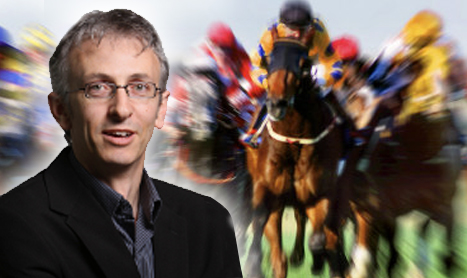There are a couple of routes into this afternoon’s Ayr Gold Cup.
There’s the trainer route. Dandy Nicholls has won two of the last four renewals of the race and six of the last 12, Kevin Ryan has won two of the last five, and Richard Fahey has had a winner and three horses placed in the last 10 years. (Nicholls has just two runners today, while Ryan and Fahey have four each.)
There’s the age route. The last nine winners were all aged four, five or six. Digging into that a little further though, there have been just two six-year-old winners and 10 six-year-old placed horses from 90 six-year-old runners in the last 10 years, which isn’t actually a great return.
Four-year-olds have fared better relative to their involvement – four winners and seven places from 78 runners – but five-year-olds have the best record by a fair way relative to their representation, with three wins and 11 places from 63 runners. (All but six of today’s contenders are aged between four and six, but there are only eight five-year-olds in the line-up.)
There’s the weight route. Six of the last seven winners and seven of the last 10 carried between 9st 2lb and 9st 9lb. (Just nine of today’s runners have been allotted a weight in that range today, although if you take jockeys’ claims into account that figure rises to 11.)
Then there is the target route. Horses that have been targeted specifically at the race, their trainers with at least one eye, if not both eyes, on the horse’s handicap rating and training him to peak on Ayr Gold Cup day, obviously have an advantage. This is a little more difficult to identify than a horse’s trainer or a horse’s weight, and it is inherent in the trainer factor to an extent, but only one winner in the last 10 years had won more than one race during the season in the lead up to the race. (Seven of today’s field have won twice this season.)
There is also the draw route on the ground. Race times at Ayr yesterday suggest that the ground is not as soft as we were expecting, more soft than heavy, but it is still soft, and that is significant. In the last 10 years, the Ayr Gold Cup has been run on good to soft or softer ground five times. In those five renewals, 16 of the 20 places (first to fourth) were filled by horses drawn between eight and 22, and 12 were filled by horses drawn between 11 and 22.
All that into the mix, and only one horse in the 26-strong field fits all five criteria – a five-year-old trained by Nicholls, Ryan or Fahey who is drawn between 11 and 22, who is set to carry between 9st 2lb and 9st 9lb and who hasn’t won more than once this year: Our Jonathan.
Not only that, but no other horse in the race even fits four of the five. Maarek and Pintura fit three of the five, but both have won more than once this season, Maarek is not trained by one of the three race specialists and Pintura is drawn a little lower than ideal.
You have to be strong to mark Maarek down on his trainer, given that he is trained by the highly talented David Nagle, but this race probably hasn’t been Maarek’s ultimate target. Actually, after he won a Group 3 race at The Curragh last weekend, the vibe was that he wasn’t going to run today. That said, he does take his racing well, he won a big handicap at The Curragh last September a week after finishing fourth in the Silver Cup on today’s card, and the 5lb that Mark Enright takes off brings his weight down to a manageable 9st 9lb. He is a player.
Pintura is also a player. However, even though he is trained by Kevin Ryan (one point), the fact that he has won twice this season is a negative, suggesting that this race hasn’t been his ultimate target. That hypothesis is backed up by the fact that he ran twice at the Galway Festival this year, winning once, and sending his handicap mark soaring from 98 to 105. You have to think that you wouldn’t have been doing that if you were planning an Ayr Gold Cup raid from early.
Contrast that with Our Jonathan. Rated 114 after winning the Ayr Gold Cup last year, his mark has slipped this season through some apparently indifferent, but ultimately eminently forgivable, performances back down to 106, just 1lb higher than the mark off which he won the race last year. That gives him a real chance.
After he beat Regal Parade in a listed race at Haydock in May on his debut this term, you would have been forgiven for thinking that he could have made up into a Group 1 sprinter this year, a Haydock Sprint Cup horse, if not quite a Golden Jubilee horse or a July Cup horse. However, somewhere along the line Kevin Ryan obviously decided to have another go at this big handicap instead, and you can be sure that he has been training him accordingly for a while.
You can forgive Marwan Koukash’s gelding his most recent disappointing run in the Great St Wilfrid, he completely missed the break and Stephen Craine wasn’t at all hard on him once it was obvious that he couldn’t win, and he actually ran well on his previous run at Chester, missing the break again and having to sit and suffer around the bends before finishing well. He got bogged down in almost untraceable ground behind Maarek at Newcastle on his previous run and, on his run before that, he would probably have beaten last week’s Park Stakes winner Libranno had he had a clearer run through the race.
Our Jonathan is one for one at the track, he goes well on soft ground, his draw in stall 12 is good – ideally he probably could have been just a little higher – and Jim Crowley is a good booking. He has all the other elements in his favour – right weight, right trainer, right age, right profile – and he shapes like the most likely winner of the race. He is favourite, but 11.0 or 12.0 still looks like value.
Did you know that as well as checking the realtime prices on BETDAQ below – you can also log into your account and place your bets directly into BETDAQ from BETDAQ TIPS.







